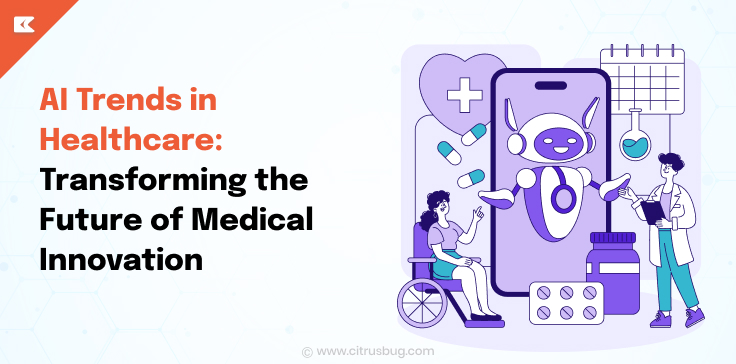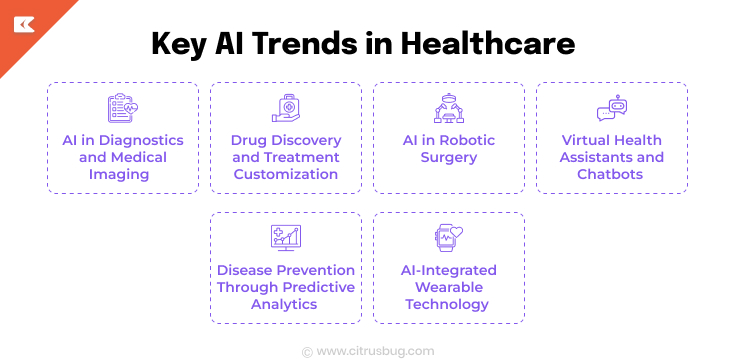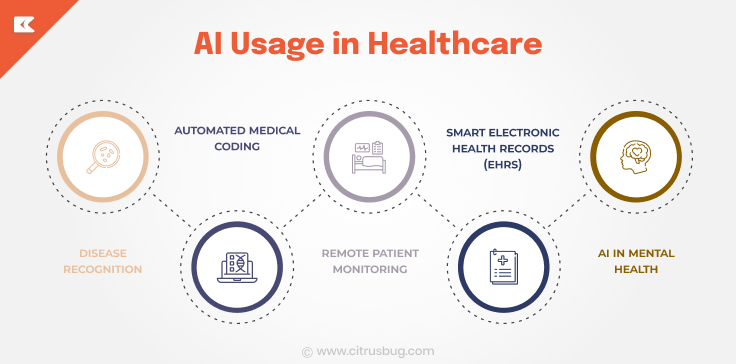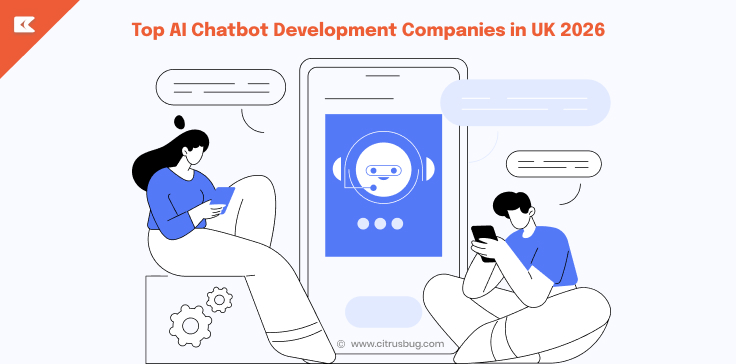AI Trends in Healthcare: Transforming Future of Medical Innovation
- March 27, 2025
-
2917 Views
- by Ishan Vyas

AI technology is revolutionizing healthcare delivery by increasing efficiency and accessibility to medical services. AI’s role in healthcare advancement has been unparalleled – from aiding in accurate diagnoses to driving significant innovations within this sector.As investments, technology, and trends evolve, they change how doctors, hospitals, and drug makers work—improving lives at every step!
The Growth of AI in Healthcare
The AI in healthcare market has shown tremendous development worldwide. The market size was $15.4 billion in 2022. It is expected to grow at 37.5% CAGR, reaching $31.6 billion in 2025 and $85.2 billion by 2030. The growth stems from targeted innovations aimed at optimizing patient experience and hospital workflows which strengthen the hospital value chain.
Source: (Grand View Research, 2023)
The wave of new developments in the field of AI extends on a broad scale, and its application will increase across the healthcare sector. 80% of hospitals worldwide are planning to adopt AI systems by 2025, in addition to private and public funding. AI-focused healthcare startups received $4.8 billion in funding in 2023, accelerating their growth and innovation.
Key AI Trends in Healthcare
1)AI in Diagnostics and Medical Imaging
The accuracy AI algorithms bring to disease detection and clinical diagnostics is unparalleled. An example is the AI-based evaluation where breast cancer could be detected at a compelling 94.5% accuracy as indicated in a study by The Lancet. Today, AI-based imaging technologies are employed in the quicker and more accurate detection of tumours, fractures and other neurological disorders.
Source: The Lancet (2023)
AI-driven radiology tools, such as IBM Watson Health and Google’s DeepMind, analyze thousands of medical images within seconds, allowing doctors to make faster and more informed decisions. This leads to earlier detection and treatment of diseases, significantly improving patient survival rates.
2)Drug Discovery and Treatment Customization
The analyzing of patient data for the most suitable medications AI technologies are developing personalized treatment plans. Accenture reported that the investment spent on discovering drugs AI Technology could help save the pharmaceutical sector an estimation of $70 billion every year.
Pharmaceutical companies are leveraging AI to speed up clinical trials and identify potential drug candidates. Platforms like Atomwise and BenevolentAI that employ deep learning techniques are working toward developing new drug formulas for cancer, Alzheimer’s disease, and other rare genetic disorders.
3)AI in Robotic Surgery
AI-powered robotic technologies are helping to perform automatic surgeries with greater accuracy, minimum recovery times, and quicker patient returns to full activity. AI-Robotic surgery is more beneficial than traditional surgery. The Journal of the American Medical Association received answers from physicians who reported a 21% decrease in complication incidence following AI-robotic system surgery.
Source: (JAMA)
Surgeons benefit from AI-driven robotic systems that provide real-time feedback, enhance dexterity, and minimize human errors. These advancements lead to shorter hospital stays and reduced post-surgical complications, improving patient experiences.
4)Virtual Health Assistants and Chatbots
The use of AI chatbots to engage patients is becoming widespread. Voice imitation through AI or computer-generated sequences enables quick medical consultations. According to McKinsey, over 60% of routine healthcare tasks can be automated using an AI-powered chatbot. The growing demand for rapid answers guarantees that patients have the answers needed before attending to other services, which ensures relief from professional burden a help for medical workers.
Chatbots like Ada Health and Babylon Health aid with symptom assessment, appointment scheduling, and giving out medication reminders. These tech solutions make it easier for people to access healthcare services, especially in places where medical personnel are few and far between.
5)Disease Prevention Through Predictive Analytics
AI technology is changing healthcare from reactive to proactive approaches. By harnessing big data analytics, AI models are capable of foretelling specific diseases’ occurrence and even pinpointing those at greatest risk for hospitalizations – according to WHO estimates this may prevent about 30% of hospitalizations through timely interventions; an activity especially useful in managing chronic diseases like diabetes or cardiovascular conditions.
Predictive models aid government institutions in monitoring and controlling pandemics. AI-powered systems were deployed during the COVID-19 pandemic to track infections as researchers tracked infections while forecasting future outbreaks to optimize resource allocation and containment strategies.
6)AI-Integrated Wearable Technology
AI-enhanced wearable devices have revolutionized patient monitoring. Smartwatches and fitness trackers use real-time vital signs monitoring technology, flagging abnormalities or potential health threats immediately. According to Statista’s estimates of the global healthcare IoT market value at approximately $84 billion by 2024 and will grow up to an expected total value of 134 billion by the end of this decade – these remote patient care solutions reduce hospital visits significantly!
In addition to vital signs monitoring, advancements in AI emotion recognition are adding another layer of sophistication to these devices. By analyzing physiological signals such as heart rate variability and skin temperature, wearables can assess a user’s emotional state, providing valuable insights into mental health and overall well-being.
Apple, Fitbit and Garmin wearables have already begun including AI features for health monitoring with Artificial Intelligence features and AI has continued its progress by helping wearables detect atrial fibrillation, monitor blood glucose levels and even predict heart attacks in some instances. This technology makes wearables invaluable tools in medical monitoring today!
The Impact of AI on Healthcare
Advancements in AI technology are a promising sign for the medical industry. Healthcare givers are now using AI to improve the quality of patient care as well as save on operational costs. Diagnostics, robotic surgeries, AI-overseen tailored treatment, and proactive decision-making by healthcare personnel are ensured to improve the clinical results for patients.
AI platforms also play a key role in healthcare software trends, providing high levels of automation as well as analytics tools, thus enhancing medical research, patient monitoring, and even administrative tasks. Many hospitals are now adopting healthcare SaaS solutions to manage medical records securely and efficiently.
AI Usage in Healthcare
There are multiple use cases of AI in healthcare that demonstrate its transformative potential:
- Disease Recognition: AI aids in recognizing diseases like cancer and Alzheimer’s in their initial stages which drastically increases the chances of successful treatment.
- Automated Medical Coding: The administrative tasks associated with e.g., billing and insurance claims with healthcare are streamlined by AI.
- Remote Patient Monitoring: Alerts are sent to the physician when an abnormality is detected, made actionable by AI enhancements. Wearable devices continuously monitor and report the health vitals of the patients.
- Smart Electronic Health Records (EHRs): The development of new AI EHR software offers automation and therefore it is more accurate because they reduce the number of mistakes made with records preserving and patient history recording.
- AI in Mental Health: Treatment of Mental health conditions is being supplemented with AI-powered healthcare chatbots that perform sentiment analysis and detect depression and anxiety.
The Future of AI in Healthcare
The prospects of AI in healthcare are greater as it’s still developing. Top AI trends to anticipate include robotic nurses, mental health diagnostics-powered AI, and integration of AI with wearable devices for 24/7 patient monitoring. AI will be greatly utilized in telemedicine for remote consultations and diagnostics in real time making it available to people all over the world.
Another new trend is the combination of AI and blockchain technology. Using this combination aids in the sharing of patient information without exposing the healthcare systems to cyber threats. We also expect advancements in the making of AI-driven Drugs that will facilitate faster vaccines and tailored treatments suitable to a person’s genes. More and more healthcare businesses are seeking for AI consulation in order to stay ahead of competition by increasing output and efficiency of their medical products and services.
Conclusion
Healthcare organizations need to modify their solutions and strategies AI-wise and keep track of the latest AI innovations to leverage new avenues of productivity and advancement. There are many emerging trends in AI, making it clear the future directions of primary healthcare services will be driven by it, and these strides warrant the focus of healthcare providers to ensure sophisticated care that is economical and centred on patients.
These AI trends in healthcare are revolutionizing medical innovation, expanding possibilities for patient care, and streamlining operations. When implemented effectively, AI-powered solutions can enhance diagnostics, personalize treatments, and improve healthcare accessibility.
Citrusbug Technolabs empowers healthcare providers with cutting-edge technology. From developing AI-driven healthcare apps to building smart medical solutions, we focus on innovation, security, and compliance. Our experts create intelligent healthcare software for hospitals, clinics, and telemedicine platforms, ensuring seamless patient experiences and optimized workflows.
Contact us today to develop a future-ready healthcare software and transform medical services with AI!





 SaaS Development
SaaS Development Web Application Development
Web Application Development Mobile Application Development
Mobile Application Development Custom Software Development
Custom Software Development Cloud Development
Cloud Development DevOps Development
DevOps Development MVP Development
MVP Development Digital Product Development
Digital Product Development Hire Chatbot Developers
Hire Chatbot Developers Hire Python Developers
Hire Python Developers Hire Django Developers
Hire Django Developers Hire ReactJS Developers
Hire ReactJS Developers Hire AngularJS Developers
Hire AngularJS Developers Hire VueJS Developers
Hire VueJS Developers Hire Full Stack Developers
Hire Full Stack Developers Hire Back End Developers
Hire Back End Developers Hire Front End Developers
Hire Front End Developers AI Healthcare Software Development & Consulting
AI Healthcare Software Development & Consulting Healthcare App Development
Healthcare App Development EHR Software Development
EHR Software Development Healthcare AI Chatbot Development
Healthcare AI Chatbot Development Telemedicine App Development Company
Telemedicine App Development Company Medical Billing Software Development
Medical Billing Software Development Fitness App Development
Fitness App Development RPM Software Development
RPM Software Development Medicine Delivery App Development
Medicine Delivery App Development Medical Device Software Development
Medical Device Software Development Patient Engagement Software Solutions
Patient Engagement Software Solutions Mental Health App Development
Mental Health App Development Healthcare IT Consulting
Healthcare IT Consulting Healthcare CRM Software Development
Healthcare CRM Software Development Healthcare IT Managed Services
Healthcare IT Managed Services Healthcare Software Testing services
Healthcare Software Testing services Medical Practice Management Software
Medical Practice Management Software Outsourcing Healthcare IT Services
Outsourcing Healthcare IT Services IoT Solutions for Healthcare
IoT Solutions for Healthcare Medical Image Analysis Software Development Services
Medical Image Analysis Software Development Services Lending Software Development Services
Lending Software Development Services Payment Gateway Software Development
Payment Gateway Software Development Accounting Software Development
Accounting Software Development AI-Driven Banking App Development
AI-Driven Banking App Development Insurance Software Development
Insurance Software Development Finance Software Development
Finance Software Development Loan Management Software Development
Loan Management Software Development Decentralized Finance Development Services
Decentralized Finance Development Services eWallet App Development
eWallet App Development Payment App Development
Payment App Development Money Transfer App Development
Money Transfer App Development Mortgage Software Development
Mortgage Software Development Insurance Fraud Detection Software Development
Insurance Fraud Detection Software Development Wealth Management Software Development
Wealth Management Software Development Cryptocurrency Exchange Platform Development
Cryptocurrency Exchange Platform Development Neobank App Development
Neobank App Development Stock Trading App Development
Stock Trading App Development AML software Development
AML software Development Web3 Wallet Development
Web3 Wallet Development Robo-Advisor App Development
Robo-Advisor App Development Supply Chain Management Software Development
Supply Chain Management Software Development Fleet Management Software Development
Fleet Management Software Development Warehouse Management Software Development
Warehouse Management Software Development LMS Development
LMS Development Education App Development
Education App Development Inventory Management Software Development
Inventory Management Software Development Property Management Software Development
Property Management Software Development Real Estate CRM Software Development
Real Estate CRM Software Development Real Estate Document Management Software
Real Estate Document Management Software Construction App Development
Construction App Development Construction ERP Software Development
Construction ERP Software Development









